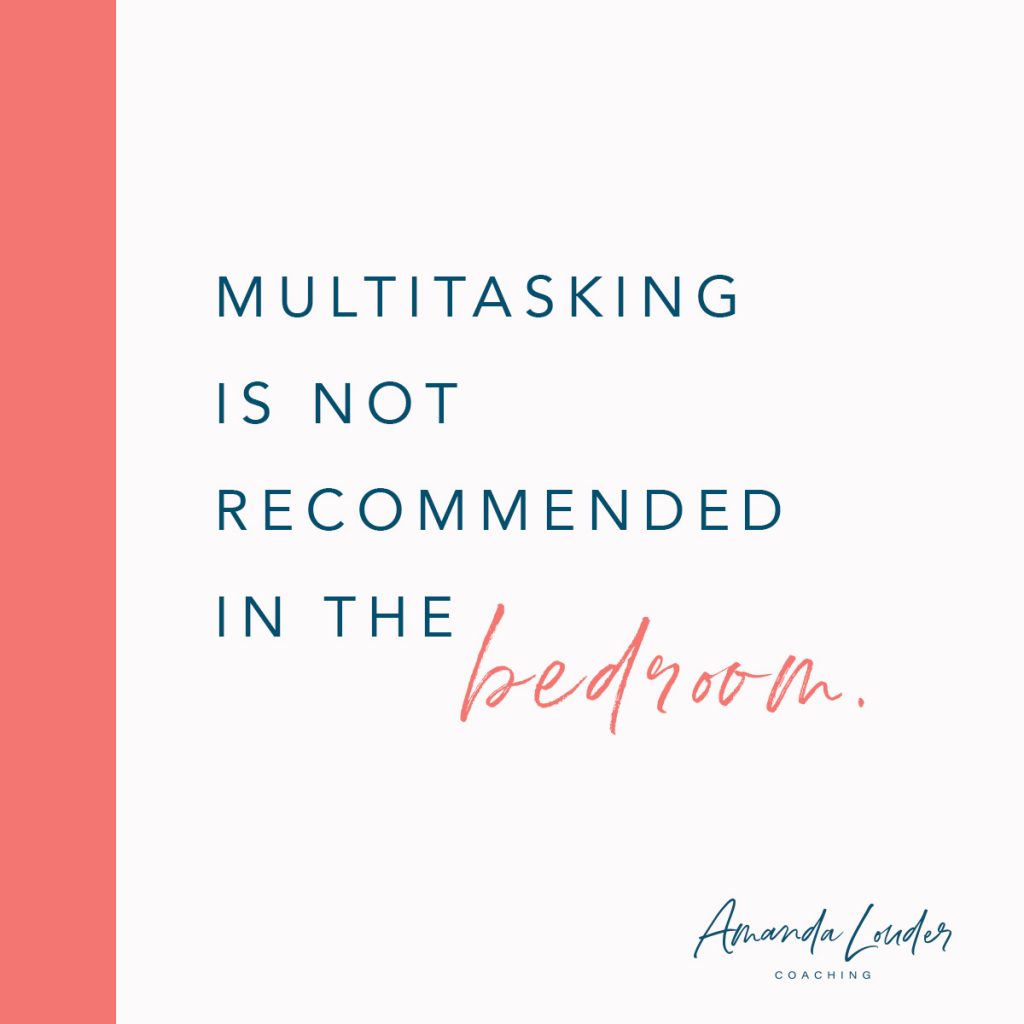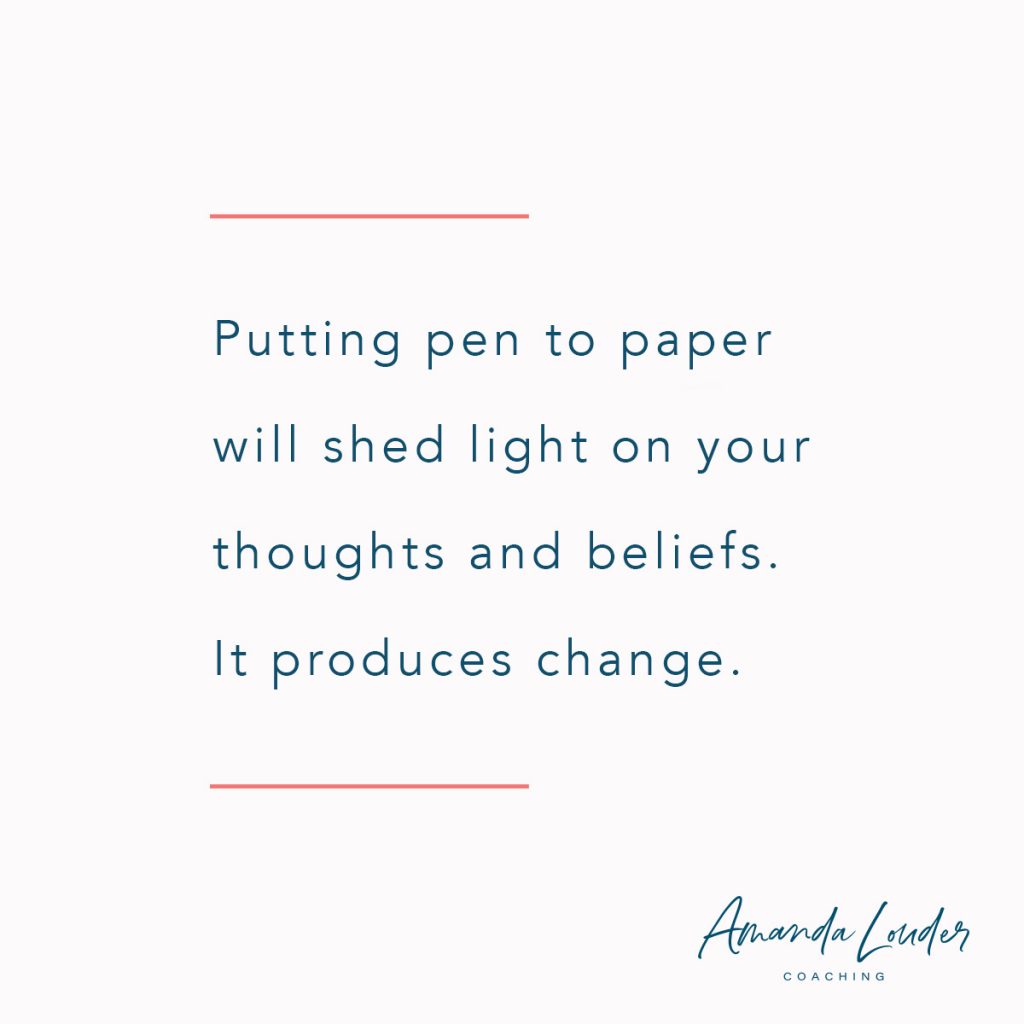
Today I am tackling the topic of mindfulness during sex. Mindfulness is all about being present and aware of what is going on around you. If you are able to create a grocery list while you are having sex, this episode is for you. I will share tips on how to curb your racing brain and focus on what emotions are happening inside of you. I will also address slowing down or calming your anxieties before you even get to the bedroom. This is one area we can stop multitasking, so let’s go!
Download your FREE Worksheet!





Show Notes:
Follow Amanda on Facebook and Instagram.
Join Amanda’s Private Facebook Group.
References for this episode:
Show Summary:
These days we are hearing about mindfulness all over the place. And today we’re going to talk about incorporating mindfulness into sex.
Mindfulness is all about being present, and being conscious and aware of what is going on around you. Mindfulness is a great practice to help you stay present in the moment during sex, which we know is so important. But we also need to learn to be present with our body and our mind before sex so that we can calm those anxieties ahead of time.
When you are stressed and feeling anxious, your body will start to exhibit physical symptoms before your brain will notice your stress and the racing thoughts. We just usually aren’t tuned into our body enough to notice these physical symptoms. I want you to work on becoming aware of what is going on in your body.
I want you to pay attention to your body right now. Do a body scan to see where you are holding tension. Are your neck and shoulders tight? Do you have a tightness in your chest? Are you walking differently? Are you squinting your eyes? Are your hands curled up in a ball? Just notice where you are holding that tension and actively work to release it.
Most of us tend to hold tension in the same spots every time we are stressed. I tend to hold all of my tension in my neck and shoulders. Every time I go and get a massage, the masseuse always mentions how tight I am there. In fact, when I was married to my first husband, and things weren’t going well towards the end of our marriage, I started waking up with headaches every day. I’ve always been one to get headaches and I’ve had migraines since I was 10-years old. But waking up with headaches on a daily basis was new. I went and saw my doctor, who sent me to a neurologist. They ran scans to see if anything was going on, which it wasn’t. But what they determined was that my shoulder and neck muscles were so tight, that they were actually pulling down on my skull and causing headaches. So I had to do months of physical therapy to release the tension and retrain the muscles. Headaches are a good indicator for me that I am under stress and need to pay attention to my body and what is going on in my mind. But if I would pay more attention to the signals that my body was giving me earlier, letting me know that I was stressed and being more mindful about what I was experiencing, being more aware of the thoughts that were creating that stress for me, then I probably wouldn’t have near as many headaches and migraines.
If you miss the physical signs in yourself, that’s ok. This is a learning process. But maybe what you ARE noticing is the racing thoughts. The anxiety you are feeling. When you have racing thoughts take a pen to paper and write them down to help you process them and become aware of them.
One of my daily practices to help keep my anxiety in check and help me understand my thoughts is called a Thought Download. Each morning, and anytime I am struggling with something or feeling a lot of negative emotion, I sit down and write. I just kind of dump everything that is going on in my brain out onto paper so that I can examine the thoughts. I don’t filter anything. Our brains come up with some pretty crazy thoughts sometimes, and self-judgement loves to sneak in there and tell me I shouldn’t be thinking those things, but I write it anyway. I can’t gain awareness over it and change it, if I don’t know what is actually going on in there. This is NOT my journal for posterity. Most of the time I just throw the paper away once I get some awareness around what is going on. But it’s an amazing practice that really helps me get some clarity. This is a practice that I also teach all of my clients and is so helpful for them as well. I will include instructions for doing a thought download in this week’s download.
For a long time, I thought I could just do this practice in my head. That I didn’t need to actually write anything down. But I was listening to something with Tony Robbins and he said that when we don’t write it down, we really can’t get a handle on it. We go into thought loops, which really isn’t helpful. So I wanted to share with you 8 powerful benefits of writing things down.
- Writing things down helps you record everything that has your attention.
We can’t remember everything we have to do these days. We have information overload. By writing down all the things we need to remember, we are actually able to think much more clearly. Our brains were designed for having ideas, not storing all of them. So write down things that go on your calendar, on your to-do list, your grocery list, your work and kids assignments. That will definitely help calm the chatter in your brain.
2. Writing things down helps clear your mind
Once you write things down, you’ll notice a sense of relief. Even if you haven’t done a single thing on your list, your brain will go from chaos and calm because it has less to think about.
3. Writing things down helps clarify your goals, priorities, and intentions
When you keep everything up in your head, your brain gets confused on what you need to do first. So, of course you feel overwhelmed with everything. But when you write things down you can literally see and evaluate each thing and make sense of them. You can more easily decide what needs to happen first, what needs more exploration, and what doesn’t need to happen at all.
4. Writing things down helps keep you motivated
Do you ever notice how sometimes you feel really motivated and sometimes you wonder where that motivation went? Motivation is a feeling, that comes from our thoughts. When you want to stay motivated, you need to think thoughts that help you feel that way. Writing down what you want to accomplish, and why, can help you remember why you are doing what you are doing and help keep you motivated.
5. Write things down encourages daily progress
When I am actively working on changing thoughts and believing new things, I love to save my thought downloads so that I can look back and see how far I’ve come. Sometimes we forget what things were like “back then” and we don’t see the progress we’ve actually made. By writing down our thoughts and feelings along the way, we can see the progress we’ve made.
6. Writing things down helps you recognize and process your thoughts and emotions
Ok, this is a big one and really what it’s all about. Often times we don’t even see the sneaky little thoughts that our brain is offering to us that really don’t serve us and get in our way of making the progress we want in our lives. When you sit down and write, you are able to see those thoughts for what they are…a thought that is optional, and gain power over it. You can’t change what you aren’t aware of.
7. Writing things down enable a higher level of thinking, and therefore, more focused action
When your brain isn’t busy remembering everything, your brain can then process anything! It’s when your brain isn’t overwhelmed that you become free to analyze and ask it important questions. You’ll be able to process your thoughts and feelings on a much deeper level that simply thinking about it when you have things down on paper.
8. Writing things down develops your sense of gratitude
A gratitude practice is one of the my favorite ways to help my clients see the goodness in their life when things seem otherwise bleak. I love having them write down things they are grateful for in themselves, their spouse, and their life. It helps them turn their thoughts from the negative to the positive. It helps them connect with the things that are truly important in their life.
I recently had a client that was really struggling with her life and her marriage. She had a lot of nostalgia for how exciting her life had been before she joined the church and got married. Her overall thought when she got married is “my life is over” and she has been living, or really NOT living, from that place for nearly 20 years. She was miserable. But I suggested she begin a gratitude practice to start noticing the good things in her life. And do you know what she realized? Yes, she had been wanting to go back to her “old life” but then she remembered that it wasn’t all fun and good times. She struggled feeling like she had a place to belong going back and forth between her divorced parents houses. She wasn’t very happy back then either. And all she had wanted back then was to have a family of her own, and that is exactly what she had now. The change in her was immediate and undeniable. She feels so much better about her life. She has gratitude for the things that she does have and she’s working to make the areas of her life where she has struggled better. It’s been so fun to watch.
Hopefully you see how important it is to write down what is going on in your head and really help you get a handle on those racing thoughts. If you are someone who struggles to not get distracted during sex with all the things on your to-do list, doing this practice BEFORE the encounter starts would be a really good idea. That way your mind can relax and be clear and you can focus on creating that wonderful experience with your spouse.
Another great practice to help with anxiety and racing thoughts is a grounding practice. A grounding practice is where you go through each of your five senses to see what you are physically sensing with your body. You’ll typically have one or two senses that you lean on more than others, but they are all there. You can do this practice anytime, but I think it’s really helpful when you find yourself distracted during sex.
We often talk about feelings on this podcast and how they start with a thought and go from the brain to the body. But we also need to pay attention to the sensations in our body. Sensations are different than feelings. While feelings start in the brain and go to the body, sensations start in the body and go to the brain. So we need to go into our body and see what it is physically sensing and feeling.
So when you start to feel that tension in your body or you notice yourself getting distracted during sex and you realize that you need to repaint the bedroom, the ceiling fan needs dusted, you need to arrange a carpool to pick up Johnny from soccer practice, and you need to add something to the grocery list, the way that you bring your mind back to the present moment is to go through the following practice:
First, take some deep cleaning breathes. This by itself lowers cortisol levels, that hormone that puts us into fight, flight, or freeze. With just a few focused breathes, we can calm down. Then go through the five senses and really focus on physical sensations.
- What do you see? Look at your spouse. Focus on them. What parts of them do you like looking at?
- What do you hear? Your breath. Your spouse’s breath. The noises of pleasure. The rustling of the sheets. Maybe some music.
- What do you smell? Some scented candles? Maybe you like the way your spouse smells.
- What do you taste? The taste of your spouses lips, mouth, tongue. The taste of their skin.
- What do you feel? Your skin on the sheets. Your spouses hands on your body. Your hands on their body. All of the skin to skin contact. All of the place their body is touching yours.
Doing this grounding practice, bringing you back to the present moment, will not only help you stay present, but can actually heighten your arousal.
Notice when you start to have a lot of self judgment during sex. You’re getting out of your body and into that cognitive space where you aren’t focusing on the sensations and what’s going on but judging the performance and does your body look right, that it taking too long and what should what should be happening instead.
So, in summary, what we’ve talked about today because I know it was a lot!
- Pay attention throughout your day of the signals your body is giving you that indicate stress and tension so that you can take care of them before you head into the bedroom.
- Spend some time emptying your brain onto paper to really get a handle on what is going on in there and what you really want to focus on.
- When your mind does start to race, doing a grounding practice, going through all 5 senses, to help bring you back to the present.
- When your mind starts to wander during sex, it’s time to gently redirect your brain back. Focus on your breath focus on what body parts are being touched and how that feels. Notice where your body is holding tension and do what you can to try and release that tension.



